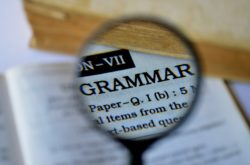March 4 is National Grammar Day. It was designated in 2008 by Martha Brockenbrough, founder of the Society for the Promotion of Good Grammar.
According to Global Language Monitor, the estimated number of words in the English language is over a million — 1,025,109, to be exact, but there is some controversy over that exact figure. However, it’s safe to say it is over a million. Language is something to celebrate. Some people think that grammar is just a boring set of rules for language, but it is more than that: it is a system for understanding language. And understanding this system and structure helps us to communicate better and even learn new languages more easily.
So….to celebrate National Grammar Day 2018, here is a fun quiz, the answers to which are grammar terms — so it’s not a quiz about the rules. The answer to each of the following 20 questions is something you might find in a glossary of grammar terms (so, hint, hint, don’t look at the glossary that is at the back of some of my books). You will find the answers if you scroll way, way down.
Here we go….
- A pronoun takes the place of a noun or another pronoun somewhere in the sentence. What is that noun or other pronoun called in relationship to the pronoun?
- A, an, and the are called what?
- There are two of them when referring to a quality of verbs: active and passive. What is this quality that verbs possess?
- A group of words that contains a subject and a verb (and might or might not be a complete sentence) is called what?
- There is a special term for nouns like these: bunch, group, team, herd, class. What is that term?
- There are five of them in Latin and even more in German and other languages. English has three. They are nominative, objective, possessive. What are they?
- A verb that is being used as an adjective (and usually ends in -ing or -ed) is called a what?
- What are these called? in a box, out the door, above the tree, under the table
- I like pizza. Pizza is a noun. What function does it have in that sentence?
- Which tense is the verb in this sentence an example of? I have read that book twice.
- I am going to the movies is a simple sentence. What is this one called? I am going to the movies, and I am meeting my friends afterwards.
- If you want to connect two sentences that are closely related, and you don’t want to use a period or a conjunction, what punctuation might you use?
- What is this called? I think you will like that movie, I certainly did.
- The little line that is used for the minus sign and to indicate a range of numbers in an index is called what?
- A verb with an -ing ending is sometimes used as a noun. What is that called?
- I am smarter than you contains a comparative adjective. What does this sentence contain? I am the smartest person in the room.
- I don’t have barely enough money to pay my bills. What grammar mistake does that sentence contain?
- Mary, my partner in crime, is my second cousin. What is my partner in crime called in that sentence?
- What part of speech are these words? Oh my! Gee! Darn!
- Most verbs form the past tense by adding –ed (played, walked), but many don’t. What are the ones that don’t called? (for example, ran, swam, threw, etc.)
That might have been fairly difficult unless you are a real grammar lover or an English teacher! Scroll down for the answers.
Don’t forget about the big event on March 16 at 7 p.m. at Copperfield’s books! The launch you don’t want to miss. Why?
There will be cake, your friends will be there, Copperfield’s is a great bookstore, and it’s FREE!
(Keep scrolling for the answers.)
My novel will be coming out very soon with a new title and my real name! Great beach read! Or bedtime read! (If you read Trashy Novel, you’ve already read it!)
(Keep scrolling for the answers.)
HAPPY NATIONAL GRAMMAR DAY!!!!
Here are the answers:
- Antecedent
- Articles (they are also adjectives)
- Voice
- Clause
- Collective Nouns
- Cases
- Participle
- Prepositional Phrases
- Direct Object
- Present Perfect
- Compound Sentence
- Semicolon (in some cases, you could use a Colon)
- Run-on Sentence
- En Dash (The hyphen is the short one in compound words, and the long one is the em dash, used to indicate interruption in thought in a sentence.)
- Gerund
- Superlative adjective
- Double Negative
- Appositive, or Appositive Phrase
- Interjections
- Irregular Verbs





#20, Verbs that form the past tense by adding -ed are also called ‘Weak Verbs’. Those that change the root are called ‘Strong Verbs’.
BTW: ‘Sneak’ is a WEAK verb. sneaked NEVER snuck!!!!!
Thanks for the comment. I didn’t know that term.
#13 can also be called a comma splice: https://owl.english.purdue.edu/engagement/2/1/34/
Yes, it certainly can. Thank you!
Thanks for the refresher grammar matters clothed in humor.
You’re welcome. Humor – always!
In addition,the German genitive and perhaps even the accusative wouldn’t exist today if it weren’t for the stabilizing influence of the written language. Various mergers of dative and accusative have taken place all over the, uh, place, but different ones. The best-known stereotypical feature of the (moribund) Berlin dialect is complete replacement of the acc. sg. by the dat. sg.; I don”t even know what happened in the plural. Bavarian-Austrian has completely replaced the dat. pl. by the acc./nom. pl., except in the 3rd-person pronoun, where this never seems to happen and the opposite sometimes happens (possibly because /ˈɛɐ̯nɐ/ is less easy to confuse with other stuff than /s/ is); in the singular, assimilation to adjacent labial* consonants often destroys the distinction between the endings |m| (dat.) and |n| (acc.) by rendering both as /m/, and this sometimes leads to the expected confusion – but that never seems to extend to the 1sg and 2sg pronouns, which don”t have either of these endings to start with. The genitive, however, would probably be restricted to a few valleys around south-central Switzerland today if it weren”t for writing. * Including /f(ː)/ and the rare cases of /v/. Both auf dem (“on the, place, with dat.) and auf den (“on(to) the, direction, with acc.) come out as /ˈaʊfm̩/ incidentally, it”s a real m; somehow we don”t do labiodental ɱ at all.
I remember the five cases in Latin: Nominative, Genitive, Dative, Accusative, and Ablative. I don’t recall what they were exactly! Nominative is subject case. Is genitive possessive? Dative I don’t know. Accusative, as I recall, is objective. Ablative?? Was it object of a preposition???? Comments anyone?
Great review of grammar. It is good to refresh your mind!
Thank you for the comment!
Thank you for the refresher course!
You are so very welcome!
Thanks for the reminders. Once an English teacher, always an English teacher. Here’s a question for you : do you use “a” or “an” before “hour” or “herb” or any other word beginning with a silent “h” or other silent beginning consonant which is followed by a vowel? I find that people don’ t know this rule.
You’re welcome! Hood question. If the “h” is silent, use “an,” which is used when the next word begins with a vowel sound. An hour, an herb, a house.
Hood question? There the “h” should be a “g” right? 🙂 But it is a good question – and this is a good answer – it’s the way the word is PRONOUNCED not the way it’s spelled. I teach SAT prep as well as ESL to non-native speakers and this is what I tell them.
Great article and good questions 🙂
Thanks for the comment and the compliment!Did I do a typo? (oops)